Trading Partner Portal: Australia
Overview
Australia-California Synergy on Climate Earns Praise
CalChamber, August 18, 2023
Interview with AmCham Australia – California Innovation Ecosystem Central to Future Prosperity for Australia, U.S.
CalChamber, August 20, 2021
Interview Series Featuring California’s Key Trading Partners – Featuring Consuls General of Australia Jane Duke in Los Angeles and Nick Nichles in San Francisco:
Shared Values Underpin Enduring Mateship Producing Jobs, Prosperity for Both Partners
CalChamber, November 17, 2020
Trade Overview
 Australia has a market economy with a GDP of $1.80 trillion and a population of 27.3 million.
Australia has a market economy with a GDP of $1.80 trillion and a population of 27.3 million.
Australia’s diverse landscape and abundant natural resources has provided the country high level of foreign investment for exporting commodities such as coal, iron ore, copper, gold, natural gas, uranium and renewable energy sources.
U.S. – Australia Trade
In addition to being a large exporter of natural resources, energy, and food, Australia also has a significant service sector. As the 14th largest export destination for the U.S., Australia has always enjoyed a strong trade relationship and a diverse portfolio with the U.S. In 2024, two-way trade equaled $51.25 billion.
Total exports were $34.58 billion with top categories being transportation equipment ($6.83 billion), non-electrical machinery ($5.76 billion), computer and electronic products ($4.92 billion), chemicals (4.54 billion), and miscellaneous manufactures ($1.96 billion).
Imports to the U.S. from Australia totaled $16.67 billion in 2024. Processed food and primary metals, which made up the bulk of imports, totaled $4.98 billion and $3.41 billion, respectively. This was followed by chemicals ($1.75 billion), computer and electronic products ($1.25 billon), and goods returned ($1.14 billion).
Australia – California Trade
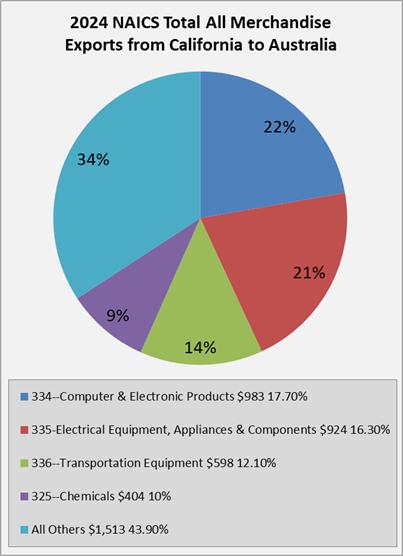
In 2024, California exported approximately $4.42 billion to the country, making it one of the largest exporting states to Australia. The largest export category from California was computers and electronic products making up $983 million of the total. This was followed by electrical equipment, appliances & components ($924 million), transportation equipment ($597 million), chemicals ($403 million), and miscellaneous manufactures ($356 million).
Imports to California from Australia totaled roughly $2.41 billion in 2024, making it the second largest importing state from Australia. Top imports were processed foods ($968 million), reimports ($298 million), computer and electronic products ($267 million), primary metal manufactures ($182 million), beverages & tobacco products ($96 million).
FDI – Australia
Australia’s total FDI stock into the U.S. totaled $110.9 billion in 2023. Australia was the 9th largest source of FDI in the U.S. as of 2022. Australian FDI supported 99,900 jobs in the U.S. in 2021. $235 million was invested in research and development and $3.6 billion went to expanding U.S. exports. The top industry sectors that were recipients of Australian FDI were: software and IT services, healthcare, business services, communications, industrial equipment, and financial services. SelectUSA
U.S. FDI into Australia totaled $193.3 billion in 2023, having an almost 10 percent increase from 2022. (Bureau of Economic Analysis).
In California, the sixteenth largest source of FDI through foreign-owned enterprises (FOEs) is Australia. In 2024, Australian FOEs in California provided 10,037 jobs through 407 firms amounting to $1.30 billion in wages. The top jobs by sector are wholesale trade, manufacturing, professional/ business services, construction, and financial activities (World Trade Center Los Angeles FDI Report).
Australia and World Trade
Australia is actively involved with Asia-Pacific Economic Cooperation (APEC) as well as engaged in the Trans-Pacific Partnership talks in an effort to lower barriers to trade.
APEC was formed in 1989. It serves as a multilateral forum in which Asian and Pacific economies can solve economic problems and cooperate in developing key economic sectors.
On February 4, 2016, after more than five years of negotiations, trade ministers representing Australia, Brunei Darussalam, Canada, Chile, Japan, Malaysia, Mexico, New Zealand, Peru, Singapore, United States, and Vietnam, signed the Trans-Pacific Partnership Agreement (TPP) in Auckland, New Zealand.
More Articles:
Governor Newsom Announces New Climate Partnership With Australia
Office of Governor Gavin Newsom, August 15, 2023
New Tasmanian Trade Advocates
Fruit Growers of Tasmania, August 10, 2021
The Bay Area-Silicon Valley and Australia: An Expanding Trans-Pacific Partnership
Bay Area Council, December 2020
Blue Dot Network: The Belt and Road Alternative
The Diplomat, April 7, 2020
WTO Trade Policy Review: Australia – January 2020
CalChamber Trade Issues: Trans-Pacific Partnership
Trade Agreements
Governor Newsom Announces New Climate Partnership With Australia
August 15, 2023 – “California and Australia are working together to fight climate change, focusing on clean energy, clean tech, nature-based solutions, trade, and more – the latest of several international partnerships California has joined to advance climate action.
California and Australia signed a Memorandum of Understanding (MOU), creating a new climate partnership between two of the largest economies in the world.
The MOU outlined five years of cooperation between California and Australia on clean energy, clean transportation, clean technologies, nature-based solutions, climate adaptation, green finance and investment and circular economy.
Led by Governor Gavin Newsom and The Honorable Dr. Kevin Rudd, Australia’s Ambassador to the United States, the California and Australia delegations signed the historic MOU at the Stanford Mansion in Sacramento.”
Signing of International Wine Trade Memorandum of Understanding Will Ease Burden on U.S. Wine Exporters, Support American Jobs
October 20, 2011 – Santiago, Chile – Members of the World Wine Trade Group (WWTG), including the United States, Chile, Argentina, New Zealand, Australia, and Georgia, joined together to sign a Memorandum of Understanding (MOU) on Certification Requirements, which will help reduce barriers to international wine trade and support exporters of wine in each participating country. This MOU will facilitate trade in wine among these countries by encouraging the elimination of burdensome requirements and certifications of wine products and ingredients.
“The MOU signed today by these six World Wine Trade Group member countries is a key example of the kind of collaboration between trading partners that is essential to increase trade and support international growth in this global economy,” said United States Trade Representative Ron Kirk. “The production and sale of wine is a valued and robust industry in the United States and this MOU will help contribute to its continued growth and viability, while supporting much needed American jobs in these challenging economic times.”
Please find the full release here.
U.S. – Australia Free Trade Agreement
On January 1, 2005, the U.S.-Australia Free Trade Agreement came into effect. The agreement eliminates tariffs on 99 percent of U.S. manufactured goods exported to Australia, accounting for 93 percent of all U.S. exports to the nation.
A comprehensive free trade agreement combined more than 345 million consumers in a market of over $19.3 trillion annually. Australian companies employ more than 84,000 American workers.
Webinar: Australia-United States Free Trade Agreement – 15 Years and Beyond
American Australian Association, October 2, 2020
Australia and the United States Free Trade Agreement – Celebrating 15 Years
Australian Embassy in the U.S., 2020
CalChamber Trade Issues: U.S. – Australia Free Trade Agreement
Regional Comprehensive Economic Partnership (RCEP)
After 8 years of negotiations, the Regional Comprehensive Economic Partnership (RCEP) was signed on November 15, 2020. The RCEP is a free trade agreement (FTA) with 10 Association of Southeast Asian Nations (ASEAN) member states—Brunei, Burma (Myanmar), Cambodia, Indonesia, Laos, Malaysia, the Philippines, Singapore, Thailand, Vietnam—and the five states with which ASEAN has existing FTAs—Australia, China, Japan, South Korea and New Zealand.
Please see the CalChamber’s RCEP pagefor more info.
RCEP – Association of Southeast Asian Nations
Text of the Regional Comprehensive Economic Partnership Agreement
Events
Events
Australia Consul General Highlights Strong California Links for Clean Energy Projects
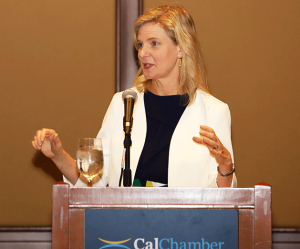
(September 13, 2024) Overlapping interests and shared values make Australia, the United States and California strong partners on economic, security and climate change issues, Australia Consul General Tanya Bennett told a California Chamber of Commerce breakfast audience last week.
Bennett was the featured speaker at the September 13 breakfast hosted by the CalChamber Council for International Trade. Her talk and lively exchanges with the audience underscored the many existing connections between Australia and the United States.
Australia-California Synergy on Climate Earns Praise
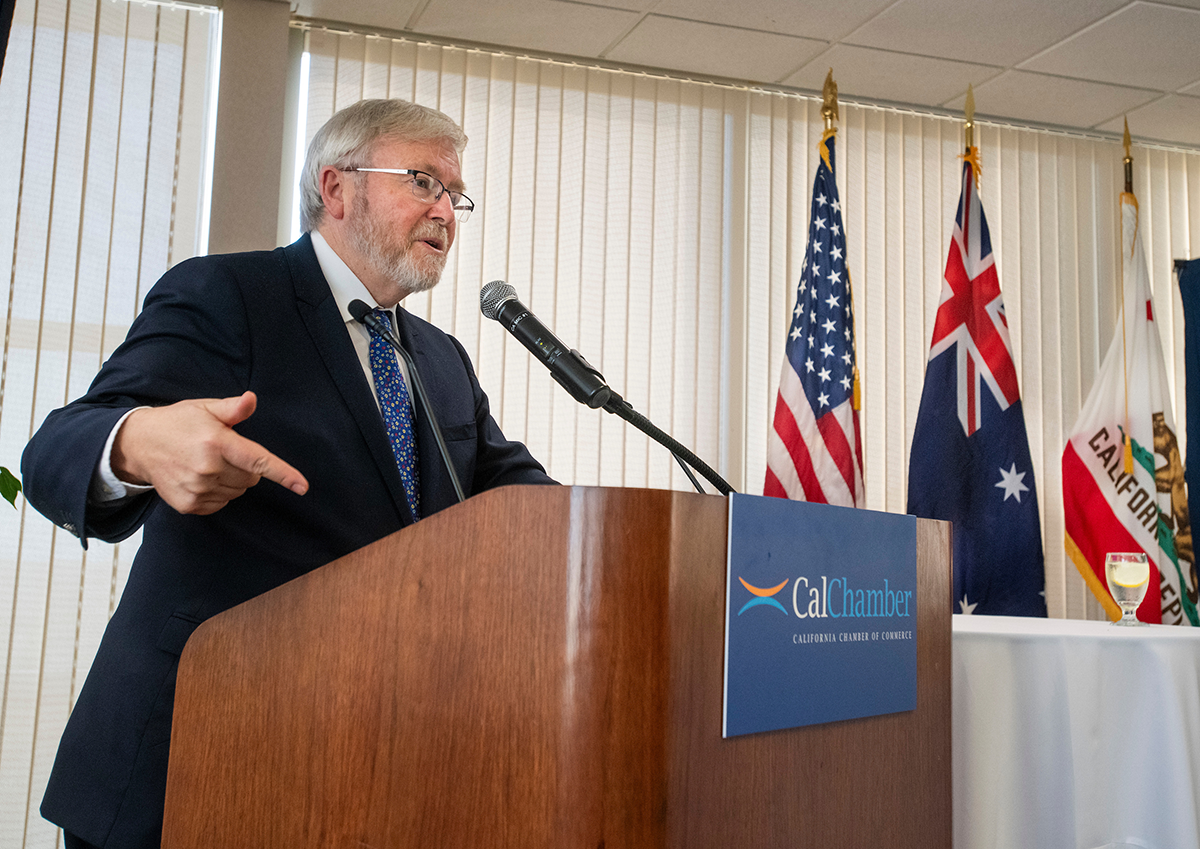
(August 18, 2023) The California Chamber of Commerce this week joined the Australian government and California Governor’s Office of Business and Economic Development (GO-Biz) in presenting an international forum and reception focused on the California and Australia collaboration on battling climate change.
The guest of honor at the August 15 gathering was Ambassador Dr. Kevin Rudd, Australia’s ambassador to the United States.
Among the close to 80 attendees were representatives of state and local government, Australian dignitaries, CalChamber Board members and the CEOs of companies that have developed innovative ways to tackle climate change challenges.
Immediately preceding the forum, California and Australia signed a Memorandum of Understanding (MOU) outlining five years of cooperation to promote clean energy/technology, green finance, and research and development.
Shared Values Form Core of Australia-California Partnerships on Climate, New Technology
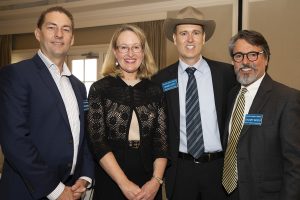
(September 14, 2022) Multiple connections enhance continuing strong economic relations between Australia, the United States and California, Ambassador Jane Duke, Consul General of Australia in Los Angeles, told a California Chamber of Commerce breakfast audience last week.
Speaking at the September 9 gathering of the CalChamber Council for International Trade, the Ambassador pointed to private sector opportunities in sectors such as critical minerals, supply chains, quantum, defense and space industries, and green energy.
The breakfast meeting, attended by more than 30 representatives of the business community and the CalChamber Board of Directors, was sponsored by United Airlines.
NSW Australia Group, CalChamber Mark 25th Anniversary of Sister State Signing
(August 19, 2022) The many shared interests of New South Wales (NSW), Australia and sister state California were discussed this week when a delegation from the NSW Parliament met with California Chamber of Commerce representatives.
CalChamber President and CEO Jennifer Barrera and Vice President of International Affairs Susanne T. Stirling met on August 15 with the delegation from the NSW Parliament, which was led by Matthew Mason-Cox, president of the NSW Legislative Council, together with Jonathan O’Dea, speaker of the NSW Legislative Assembly.
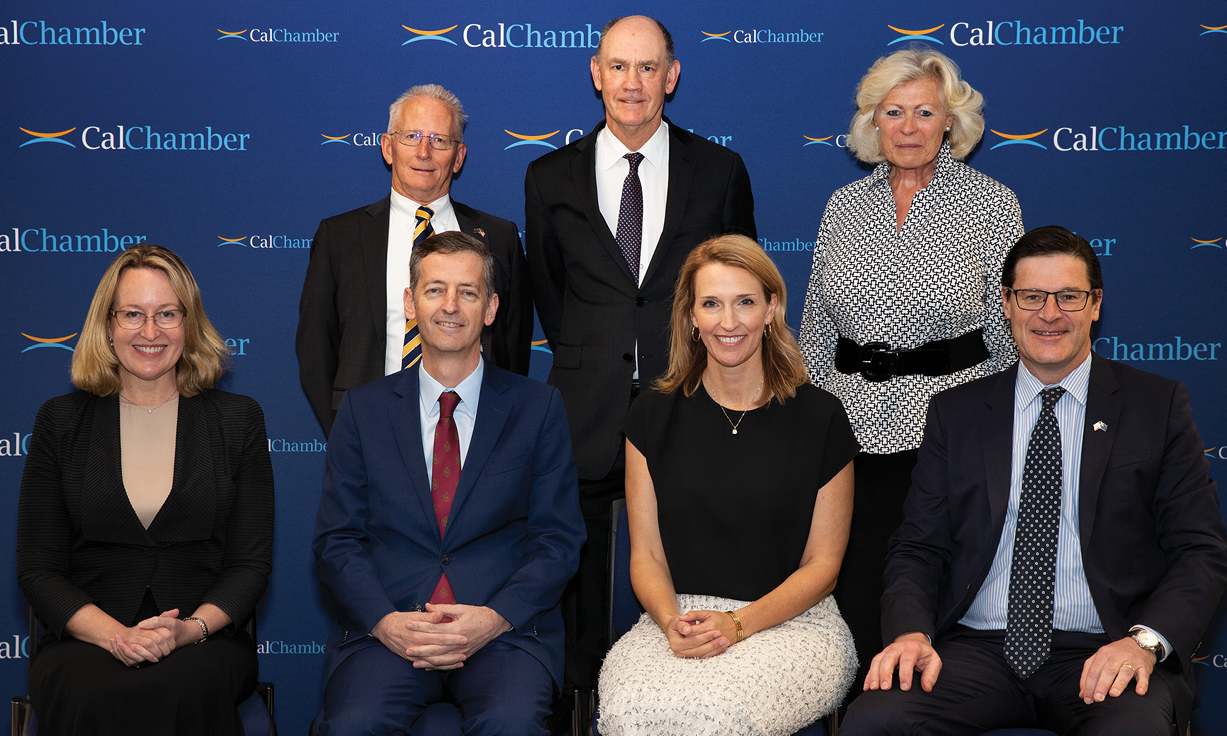
NSW Australia, CalChamber Share Sister State Discussion
(August 6, 2018) CalChamber President and CEO Allan Zaremberg and Vice President of International Affairs Susanne T. Stirling met with a delegation from the Parliament of New South Wales (NSW), Australia, led by the Honorable John Ajaka, President of the Legislative Council.
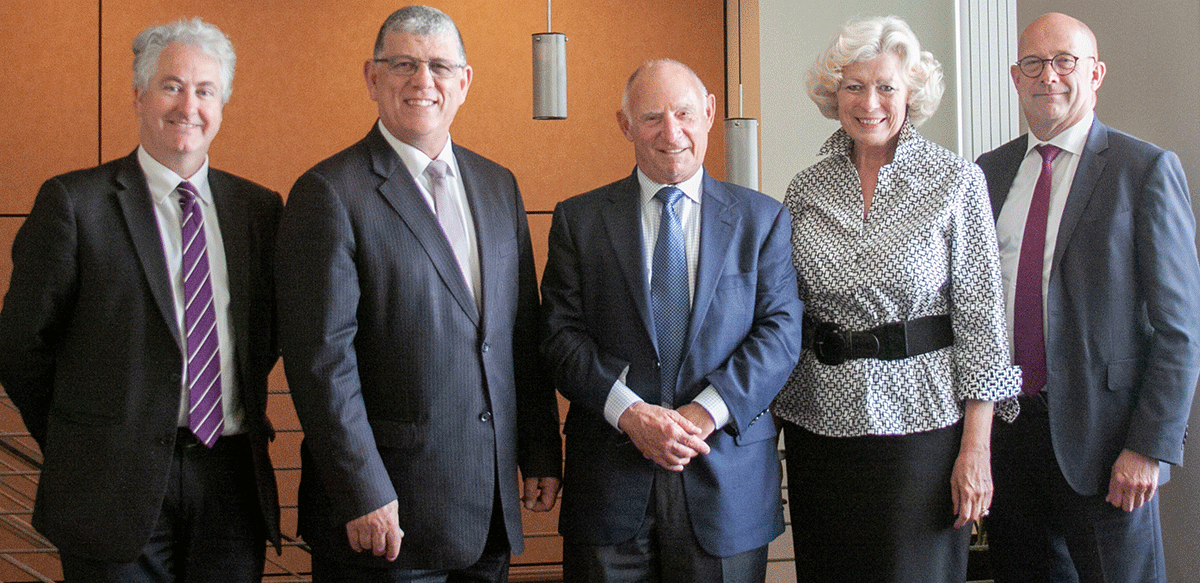
California and New South Wales share a Sister State relationship, a symbol of mutual goodwill, thereby encouraging bilateral cooperation. California and New South Wales, Australia became sister states through a resolution in 1997 as the two states share many economic and cultural similarities. California and New South Wales both have diverse landscapes, are key exporting states for their respective countries, and have agriculture and mining industries that are vital to both states’ economies. More recently, the two have shared a similarity in the wine industry and growing service sector, as well as the film, sports and leisure industries.
The group discussed the structure of the NSW Parliament, governance issues, infrastructure projects, research and development, and technology exchanges. Recognizing the U.S.-Australia Free Trade Agreement, there was discussion of the new Trump administration proposal of the Indo-Pacific Vision, encompassing a region of 14 countries, including Australia, Bangladesh, Burma, India, Indonesia, Japan, Malaysia, New Zealand, Philippines, Singapore, South Korea, Taiwan, Thailand and Vietnam.
CalChamber Hosts Meeting on California – Australia Trade Relations
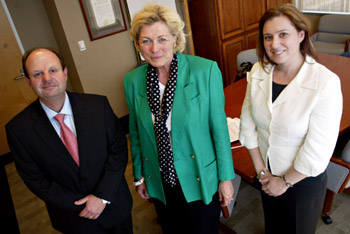
(August 13, 2008) California trade relations with the Australian state of Victoria were among the topics discussed during a recent meeting at the California Chamber of Commerce.
Victoria—which is located in southeast Australia—is home to 5 million people with 3.6 million living in the capital city of Melbourne. In 2007, the United States exported $19.2 billion worth of goods to Australia, a 35 percent increase since 2004, the year before the U.S.-Australia Free Trade Agreement (FTA) went into effect.
Sister State
Relations with Sister State New South Wales Remain Strong
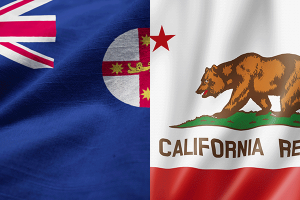 (June 29, 2021) Nearly 25 years ago, California and New South Wales, Australia declared themselves as sister states in light of their many social, economic and cultural ties.
(June 29, 2021) Nearly 25 years ago, California and New South Wales, Australia declared themselves as sister states in light of their many social, economic and cultural ties.
Today, the similarities between California and New South Wales continue to form a strong bond, even as in-person gatherings gave way to virtual ones during the pandemic.
Commercial Centers
New South Wales and California remain the commercial, industrial and financial centers of Australia and the United States. Moreover, both states are leading centers for the production of wine, films, gold, and sports and leisure activities.
The early history of both states was dominated by mining and agriculture, as well as diverse and multicultural populations, and a Pacific Rim orientation. That history forms a solid foundation for activities today.
Further strengthening the California-New South Wales sister state relationship is the enduring mateship between Australia and the United States. Not only do the two nations share democratic values, but the ties linking them cover the entire spectrum of international relations — from commercial, cultural, and environmental contacts to political and defense cooperation.
Talented People
Talent mobility has been another hallmark of U.S.-Australia relations. Since the U.S.-Australia Free Trade Agreement came into effect in 2005, thousands of talented Australians — many still based in California — have come to the United States to work under a special visa.
The recently established Australian global talent visa streamlines mobility for Californians and Americans, as well.
Key Country Contacts
Resources
CalChamber Resources
Business
Business
- U.S. Commercial Service, Australia
- American Australian Association
- Austrade’s San Francisco Landing Pad for Businesses
- Austrade OnLine Access USA
- Australia Constructors’ Association
- Australian Business Limited
- Australian Chamber of Commerce & Industry
- Business SA
- Chamber of Commerce & Industry of Western Australia